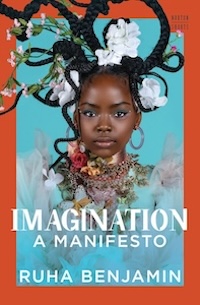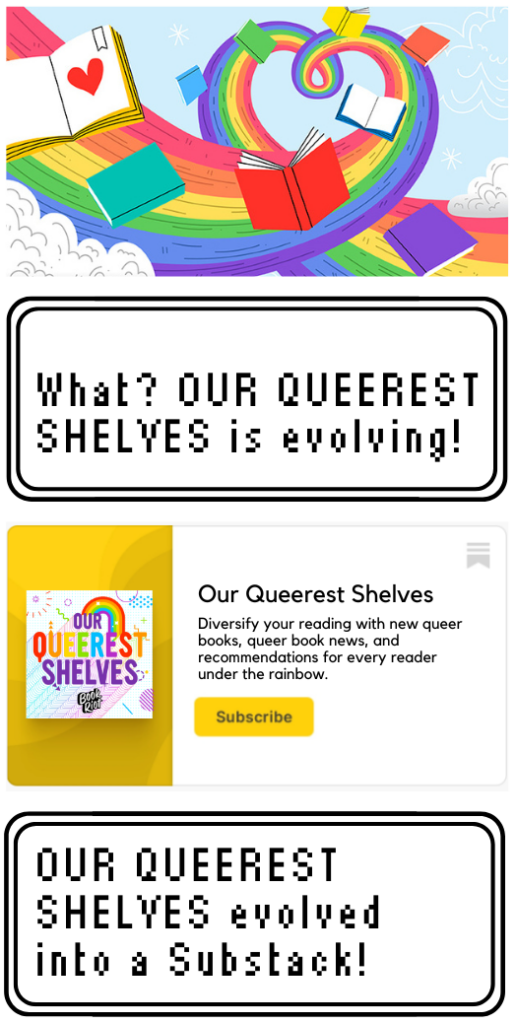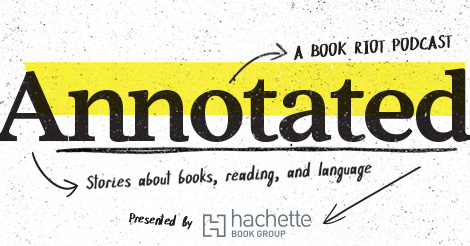
The following is an excerpt from Imagination: A Manifesto by Ruha Benjamin.
Drawing on the argument that all of the most profound mechanisms of human suffering and oppression—racism, sexism, classism, etc.—are products of human imagination, Benjamin, a sociologist and professor of African American Studies at Princeton University, issues a call for us “to take imagination seriously as a site of struggle and a place of possibility for reshaping the future.” What if the things we dream of actually are possible, and our imaginations are the key to liberation?
Cutting School
Once a week in fifth grade, I cut school. Or so it seemed. On Fridays, I jumped out of bed and threw on the clothes I had laid out the night before, then raced to the kitchen to pour a big bowl of Cheerios. Cereal devoured, I huffed and puffed, waiting for my mom to get my little brother, Jamal, ready and then open the front door, so I could race up the block to South Conway Elementary School.
Arriving just as the 8:00 a.m. bell rang, I didn’t scurry in after the other kids, their backpacks bouncing up and down in the crowded halls. Instead, I boarded a bus waiting just under the flagpole and, together with a handful of other students, almost all of whom were white, headed to a portable classroom trailer at the back of the nearby middle school.
There we entered another world—no ringing bells telling us to move to another class, no sitting at desks lined up in rows, no stuffing ourselves with information to be regurgitated on tests. We cut school. Or so I thought.
I spent what I considered “Freedom Fridays” in the Pelican Program for students who, I would only later learn, were labeled “gifted and talented.” At the time, it seemed to me that adults had decided I could have fun once a week. Or perhaps they just wanted us out of their hair. This was, after all, fifth grade. I was the troublesome kid who got up in the middle of class to shush students making noise in the hallway, to the chagrin of the actual teacher.
The coolest part of cutting school was that my best friends, Qima and Mary, were in the Pelican Program too. We were the only Black students selected from our majority white school, where Black children made up about 30 percent. Everything else from those days is a blur. All I remember was the three of us floating together in a bubble of Black Girl Magic before it was a hashtag. We danced and sang and created poems and plays. Freedom Fridays were full of expressiveness, friendship, and play.
The scholar Imani Perry gives voice to what such mental freedom has meant for us: “Imagination has always been our gift. That is what makes formulations like ‘Black people are naturally good at dancing’ so offensive. Years of discipline that turn into improvisation, a mastery of grammar and an idea that turns into a movement that hadn’t been precisely like that before—that is imagination, not instinct.”
Pelican was a weekly retreat from the usual strictures of schooling—worksheets, homework, and tests were replaced by music, movement, and make-believe. But who decided we could steal away? And from what were we escaping?
Visiting its website, I learned that there are three pathways into the Pelican program—aptitude, achievement, and performance: “The State of South Carolina and the District declares by evaluation and eligibility standards that the gifted child has academic needs that must be met in a differentiated environment.” This begs the question: Who thrives in an undifferentiated environment?
“The mission of gifted education is to maximize the potential of gifted and talented students by providing programs and services that match the unique characteristics and needs of these students.” So, then, is the mission of standard education to minimize or hold at bay the potential of most students?
Yes, I think that is precisely what it does, especially if we consider the eugenicist roots of testing and ranking. In the 1920s the College Board commissioned psychologist and eugenicist Carl C. Brigham to develop the Scholastic Aptitude Test (SAT). Brigham, a Princeton alumnus who had recently authored A Study of American Intelligence (1923), hailed the superiority of the “Nordic race group” and warned that with the “promiscuous intermingling” of new immigrants, the education system was declining at “an accelerating rate as the racial mixture becomes more and more extensive.” Standardized testing has always been predicated on a racist, classist, sexist, and ableist standard.
A world that relies on social inequality to keep its machinery running can only afford for a handful of people to imagine themselves “gifted.” Gifted = destined leaders and bosses, visionaries and innovators who have the time and resources to design the future while the masses are trained to sit still, raise their hands, and take instruction.
Doesn’t the unbearable hubris and entitlement of many of society’s “leaders,” whether in industry or politics or even do-gooding professions, stem from us being told all our lives that we are “special”? Or more precisely, of us being made special and treated by the law and culture as the chosen ones?
Meanwhile, the majority of “normals” (to borrow a term from the sci-fi film Gattaca) are expected to take orders, complete tasks, stand in line, clock in and out . . . punctually, obediently, subserviently. No dancing in the halls, and certainly no daydreaming about a world put together differently.
Mary, Qima, and I were “gifted” alright . . . gifted time and space to imagine differently. Not because we were different but because we were given a chance to be different.
The fact is, “exceptional Negroes” have always been a staple of an apartheid-like educational system that separates the “gifted” from the “normal,” and both from the “naughty” or “underachieving.” Sticks and stones will only break my bones, but words can lift or crush me. For some, the existence of “exceptional Negroes” suggests that the system is not racist. But doesn’t such tokenistic inclusion—in which a few individuals are given provisional membership into an otherwise exclusive club—maintain the status quo by making it seem more accessible than it really is?
Without a handful of Black and Brown unicorns in honors classes and gifted programs, we might see more clearly the broader patterns of exclusion. We might realize that school tracking perpetuates intraschool segregation, that even when schools are racially diverse, even when they are in the suburban “promised land,” they often remain deeply unequal. Indeed, the flip side of hoarding gifted, honors, and Advanced Placement classrooms for predominantly white students is the funneling of Black students into special education and remedial programs, what education researchers describe as de facto racial segregation.
One activity at Pelican that I remember vividly required us to invent new uses for ordinary objects like scissors, rubber bands, and erasers. Years later, I heard a talk by noted educator Sir Ken Robinson in which he described a study about how researchers measure genius-level “divergent” thinking by assessing students’ ability to come up with lots of possible ways of interpreting and answering questions.
In the study, 1,500 kindergarteners were asked questions like “How many uses can you think of for a paper clip?” At that young age, 98 percent of the children scored at “genius level” for divergent thinking. But over the next ten years, this capacity was schooled out of them. “We all have this capacity,” insisted Robinson, but “it mostly deteriorates.” Yet “deteriorates” makes it seem like a natural process of decay, when really it is a concerted, organized process of squashing an otherwise widespread capacity to think, know, and imagine. As writer and activist adrienne maree brown reminds us, “We are in an imagination battle.”
The irony, of course, is that the very place where inventive thinking could be—some would say should be—cultivated is where it gets snuffed out. Except, of course, for the lucky few who get pulled out of school and given an opportunity to diverge, experiment, and make mistakes.
Otherwise, if you let your imagination run free, you’re likely to get into trouble. In 2013, sixteen-year-old Black teenager Kiera Wilmot did a science experiment mixing toilet bowl cleaner and aluminum foil in a water bottle. It caused a small explosion on school grounds, and she was automatically expelled. The Florida assistant state attorney charged her with two felonies filed in adult court. The charges were eventually dropped as part of a diversion program that allows people facing criminal conviction to meet certain service requirements instead.
However, rather than being allowed back into her honors classes, Kiera had to finish her junior year at an alternative high school—a euphemism, in this case, for a school for “bad” kids. There, Kiera felt intellectually uninspired. As she shared with the American Civil Liberties Union (ACLU): “I’m not getting the challenge that I used to have. I don’t have homework. There is no German class, and there is no orchestra.” It is doubtful Kiera would have been treated with such contempt were she not Black, and because of the zero-tolerance disciplinary policies that uphold rigid rules and end up alienating and pushing out many young people.
The outsized response to Kiera’s science experiment explosion was also fueled by anti-terrorism fervor in the wake of 9/11 and the Boston marathon bombing—her project came just eight days after the latter. Another outcome of these events was an increase in anti-Muslim hatred, which has not waned. According to a 2016 Gallup poll, 38 percent of respondents backed “a new law that would prevent any Muslim from entering the U.S.” and 32 percent supported a “special ID” for Muslims, including those who are American citizens. These alarming statistics reflect a long-standing racial imagination that infects social life and periodically erupts into the headlines, as it did in the case of Texas teenager Ahmed Mohamed.
In 2015, Ahmed was interrogated, suspended, and fingerprinted for constructing a clock inside his pencil case. He used a small circuit board, power supply, and digital display, inventively transforming the case. Dismayingly, his teacher and principal suspected the clock of being a bomb. Through the distorting fun-house mirrors of white supremacy and anti-Muslim hatred, he was deemed guilty instead of gifted, threatening instead of talented.
Kiera and Ahmed would eventually meet at the White House at an Astronomy Night, hosted by President Barack Obama. Yet Kiera’s invitation wasn’t extended until after online commentary circulated suggesting she should be bestowed the same honor as Ahmed. As Kiera shared, the White House had invited her not so much because of her science project but because of what she called “the arrest and all the hardships. I am a woman of color who was pushed out of school.” These hardships reveal that Kiera’s path to a White House visit is not the Cinderella story promised to many via the gifted and talented route. Kiera shared at a press conference during her visit to Washington, DC, “To this day, I still get people who harass me about it and call me a terrorist.” And she was haunted by a felony arrest, which she was told would take five years to clear from her record.
Unicorn status is a fickle prize that can be revoked as quickly as it is bestowed. Instead of rallying around individual exceptionalism, we need to see the bigger picture and imagine new systems of education that cultivate everyone’s creativity and curiosity. So what is there to do?
The most effective means to refute the prevailing ideologies is to do so collectively—crafting new stories, images, ways of interacting, and investments in those who have been denigrated and discarded. To think about the collective also means being okay with less focus on exceptionalism and instead giving all students opportunities to stretch their imaginations.
I wrote this book for all the Kieras and Ahmeds of the world, and all those who cross their paths. It is for organizers and artists, students and educators, parents and professors, realists and romantics who are ready to take Toni Morrison’s instruction to heart: Dream a little before you think.
In these pages, I weave together a lifetime of observations about the centrality of imagination in all our lives; lively engagements with people from many different fields who have ruminated on the power of imagination; promiscuous encounters with pop culture and social media where collective imagination is woven and warped; and practical guidance on how we can exercise our imaginations.
I draw upon over a decade of teaching that aims to build students’ powers of speculation with projects that involve imagining tools, toolkits, and worlds that break with current social hierarchies. In the process, we will confront the little voice in our head whose job it has been to police our own imaginations: A world without prisons? Ridiculous. Schools that foster the genius of every child? Impossible. Work that doesn’t grind us to the bone? Naive. A society where everyone has food, shelter, love? In your dreams. Exactly.
We need to give the voice of the cynical, skeptical grouch that patrols the borders of our imagination a rest. After all, “Dangerous limits have been placed on the very possibility of imagining alternatives,” insists scholar and activist Angela Y. Davis. “These ideological limits have to be contested. We have to begin to think in different ways. Our future is at stake.” Imagination is a field of struggle, not an ephemeral afterthought that we have the luxury to dismiss or romanticize.
Imagination: A Manifesto is a proposal for exorcising our mental and social structures from the tyranny of dominant imaginaries. It is a field guide for seeding an imagination grounded in solidarity, in which our underlying interdependence as a species and with the rest of the planet is reflected back at us in our institutions and social relationships.
Look around: humanity is in the eye of multiple storms. Will we continue shutting off the power of the masses so that a minority of people can stay warm, or will we build the necessary infrastructure so that everyone can thrive? Like author Arundhati Roy, I believe “another world is not only possible, she is on her way. . . . On a quiet day, if I listen very carefully, I can hear her breathing.”
Excerpted from Imagination: A Manifesto. Copyright (c) 2024 by Ruha Benjamin. Used with permission of the publisher, W. W. Norton & Company, Inc. All rights reserved.


